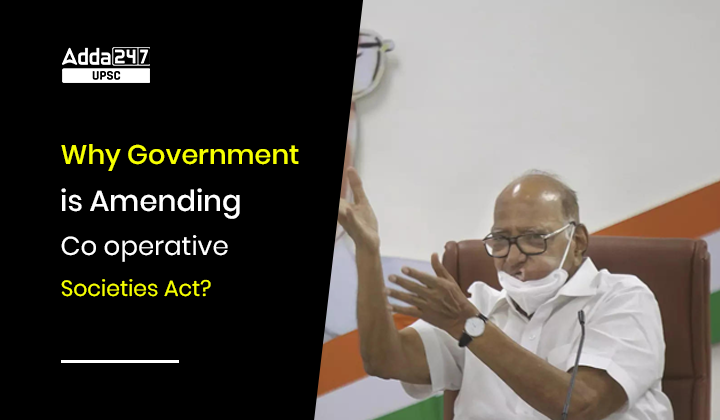Table of Contents
Relevance of Cooperative Societies for UPSC
Cooperative Societies: Cooperative Societies covers GS Paper 2: Government Policies & Interventions, GS Paper 3: Growth & Development, Industrial Growth.
Why Cooperative Societies in News?
Cooperative Societies are in news because the bill to amend the Multi State Cooperative Societies (MSCS) Act, 2002, was introduced in the Lok Sabha on December 7, 2022.
What are Multi State cooperative Societies?
- According to the International Cooperative Alliance (ICA), cooperative Societies are people centered enterprises jointly owned and democratically controlled by and for their members to realize common economic, social and cultural needs and aspirations.
- Multi State cooperatives are societies that have operations in more than one State — for instance, a farmerproducers organisation which procures grains from farmers from multiple States.
- The board of directors are from all the States these collectives operate in and control all the finances and administration.
- There are close to 1,500 MSCSs registered in India with the highest number being in Maharashtra.
Also Read:
International Day of Cooperatives 2022: History, Theme and Significance
What are the issues with the cooperative sector?
- The independent and autonomous character of cooperative societies was to be crucial in their functioning. However, H.S. Shylendra, professor at the Institute of Rural Management, Anand (IRMA) points out in a 2021 paper that the inclusion of cooperatives in the planning process as development instruments made the sector an avenue for dispensing patronage to the supporters of ruling political parties.
- Moreover, the policy of State governments to contribute to the share capital of the cooperatives enabled governments, “in the name of public interest” to directly intervene in the working of cooperatives which are legally autonomous.
- Notably, the potency of cooperatives as an apparatus of political control can be seen in States such as Maharashtra, Kerala, Gujarat, parts of Karnataka, Tamil Nadu, Madhya Pradesh and West Bengal. Besides,
- MSCSs were formed to ease the operation of collectives throughout the country. On the contrary, IRMA researcher Indranil De points out that in spite of their potential, MSCSs are facing issues regarding trust, which is the very basis of cooperation.
- This has brought MSCSs under multiple controls from the Centre. Monitoring is one of the important institutional functions in a collective organisation but if monitored from much above, it takes a top down approach as opposed to a grassroots one.
Also Read:
Cooperative Societies on Government e Marketplace (GeM) Platform
Which are the Constitutional Provisions Regarding Co-Operative Societies?
- The Constitution (97th Amendment) Act, 2011 added a new Part IXB right after Part IXA (Municipals) regarding the cooperatives working in India.
- The word “cooperatives” was added after “unions and associations” in Article 19(1)(c) under Part III of the Constitution.
- This enables all the citizens to form cooperatives by giving it the status of fundamental right of citizens.
- A new Article 43B was added in the Directive Principles of State Policy (Part IV) regarding the “promotion of cooperative societies”.
What was Supreme Court’s Judgement on Co-Operative Societies in the Year 2021?
- In July, 2021, the Supreme Court struck down certain provisions of the 97th Amendment Act, 2011.
- It gave a major boost for federalism as the amendment shrank the exclusive authority of States over its co-operative societies.
- Part IX B dictates the terms for running co-operative societies.
- As per the SC, Part IX B (Articles 243ZH to 243ZT) has “significantly and substantially impacted” State legislatures’ “exclusive legislative power” over its co-operative sector.
- Also, the provisions in the 97th Amendment were passed by Parliament without getting them ratified by State legislatures as required by the Constitution.
- The SC held that states have exclusive power to legislate on topics reserved exclusively to them (cooperatives are a part of State list).
- The 97th Constitutional Amendment required ratification by at least one-half of the state legislatures as per Article 368(2).
- Since the ratification was not done in the case of the 97th amendment, it was liable to strike it down.
- It upheld the validity of the provisions of Part IX B which are related to Multi State Cooperative Societies (MSCS).
- It said that in case of MSCS with objects not confined to one state, the legislative power would be that of the Union of India.
Why does the Government Wants to Amend the Co-Operative Societies Act?
- To plug the “loopholes” in the Multi State Co-Operative Societies Act(MSCS Act, 2002) the Centre introduced a Bill seeking to amend the law for more “transparency” and “ease of doing business”.
- The amendments have been introduced to improve governance, reform the electoral process, strengthen monitoring mechanisms and enhance transparency and accountability.
- The Bill also seeks to improve the composition of the board and ensure financial discipline, besides enabling the raising of funds in multi State cooperative societies.
What will be the key changes?
- The Bill provides for the creation of a central Cooperative Election Authority to supervise the electoral functions of the MSCSs.
- The Authority will have a chairperson, vice chairperson, and up to three members appointed by the Centre.
- It also envisages the creation of a Cooperative Rehabilitation, Reconstruction and Development Fund for the revival of sick multi State cooperatives societies.
- This fund shall be financed by existing profitable multi State cooperative societies which will have to deposit either ₹1 crore or 1% of the net profit into the Fund.
- In order to make the governance of multi State cooperative societies more democratic, the Bill has provisions for appointing a Cooperative Information Officer and a Cooperative Ombudsman.
- To promote equity and facilitate inclusiveness, provisions relating to the representation of wo men and Scheduled Caste/Tribe members on the boards of multi-State cooperative societies have also been included.
What Next?
In 1991, the Choudhary Brahm Perkash Committee of the planning commission made far reaching recommendations to reorgnise multi State cooperatives but the Act has not been modified as per the report. So, its high time to refresh the act as per the need of today’s times.
FAQs on Cooperative Societies Act
Q1. Which Constitutional Amendment Act deals with Cooperative Societies in India?
Ans. The Constitution (97th Amendment) Act, 2011 added a new Part IXB right after Part IXA (Municipals) regarding the cooperatives working in India.
Q2. Which are MSCSs?
Ans. Multi State cooperatives are societies that have operations in more than one State — for instance, a farmerproducers organisation which procures grains from farmers from multiple States.
Q. Has the word “cooperatives” any mention in article 19 of Indian Constitution?
Ans. The word “cooperatives” was added after “unions and associations” in Article 19(1)(c) under Part III of the Constitution.
Also Read:
Recent IR Articles:
| How BIMSTEC Can Build a New South Asian Regional Order?: The Hindu Editorial Analysis | First India-Central Asia Meeting of NSAs: Significance for Regional Security? | India’s G20 Presidency- 1st Sherpa Meeting Begins | What is Sylhet-Silchar Festival 2022? | All Details for UPSC |
| UNESCO India Africa Hackathon 2022 is being Organized in Uttar Pradesh | What is India-Australia FTA? | Know Everything about AI-ECTA for UPSC | What is India-Bangladesh Friendship Pipeline (IBFPL)? | What is Bali Yatra of Odisha? | Significance for UPSC |
| Removal of India from US’ Currency Monitoring List: Possible Outcomes for India? | 2nd BIMSTEC Agriculture Ministers Meeting 2022 | Russia’s loss in Kherson- Russia Withdrew from Kherson | Indo-Pacific Regional Dialogue 2022 (IPRD-2022) |
| COP 19 CITES Meeting 2022- Relief provided to Indian Handicraft Exporters | G20 Summit 2023- India’s G20 Presidency & Tourism Opportunities for N-E States | India’s “In our LiFEtime” Campaign Launched at COP 27, Sharm El-Sheikh | 19th ASEAN-India Summit 2022- Key Outcomes and Way Forward |
Recent Economy Current Affairs:
| The Centre Forms Panel to Revamp MNREGA Scheme! | Why National Anti Profiteering Authority(NAA) to be Subsumed into CCI? | Know Everything for UPSC | What is India-Australia FTA? | Know Everything about AI-ECTA for UPSC |
| Why India’s Fight Against Inflation Continues? | Today’s the Hindu Editorial Analysis for UPSC | Removal of India from US’ Currency Monitoring List: Possible Outcomes for India? | The 17th G20 Summit in Bali: To Focus on Food and Energy Security |
| What is the Latest Amendment in the Existing Foreign Trade Policy 2015-20? | Sovereign Green Bonds Framework: Final Sovereign Green Bonds framework has been Approved | One Nation, One ITR Form: The CBDT Proposes a Single ITR Form For All! |
| What is CRAR: Why a Bank is Required to Maintain CRR? | India’s Manufacturing Purchasing Managers’ Index (PMI) | RBI To Hold Special MPC Meet on Inflation |



 TSPSC Group 1 Question Paper 2024, Downl...
TSPSC Group 1 Question Paper 2024, Downl...
 TSPSC Group 1 Answer key 2024 Out, Downl...
TSPSC Group 1 Answer key 2024 Out, Downl...
 UPSC Prelims 2024 Question Paper, Downlo...
UPSC Prelims 2024 Question Paper, Downlo...





